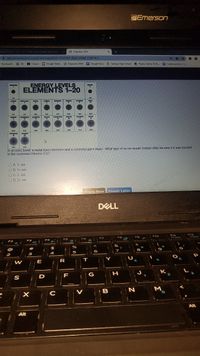
Chemistry
10th Edition
ISBN: 9781305957404
Author: Steven S. Zumdahl, Susan A. Zumdahl, Donald J. DeCoste
Publisher: Cengage Learning
expand_more
expand_more
format_list_bulleted
Concept explainers
Question
thumb_up100%

Transcribed Image Text:DEmerson
Chensan updaes lsteork
O Fmpower 2021
A educate.lindsay.k12.ca.urs/iFrame.aspx?iCtl=STUDENT_BASE HOME CONTROL
Boolmarks
E IXL
Classes
O Google Slides
O Empower 2020 E
E Google Docs t Lindsay High School R Physics Safety & Ski. E Guided practice 3 (.
ENERGY LEVELS
ELEMENTS 1-20
CAON
AUR M
CALOM
20
In an ionic bond, a metal loses electrons and a nonmetal gains them. What type of an ion would Sodium (Na) become if it was bonded
to the nonmetal Chlorine (CI)?
O A. 1- ion
O B. 1+ ion
OC. 2- ion
O D. 2+ ion
Score Now Finish Later
DELL
F12
F11
PriScr
F10
eert
FB
F6
F7
F4
&
@
#
%24
6
E
R
T
K
2
D
F
G
M.
C
Alt
Alt
Expert Solution
This question has been solved!
Explore an expertly crafted, step-by-step solution for a thorough understanding of key concepts.
Step by stepSolved in 2 steps with 1 images

Knowledge Booster
Learn more about
Need a deep-dive on the concept behind this application? Look no further. Learn more about this topic, chemistry and related others by exploring similar questions and additional content below.Similar questions
- cb idium 5.47 55 Cs Cesium 132.9 87 Fr Francium (223) Sr Stron 87. E 1 B 1 28. If the total energy change, A E, of a system is - 50 J, the process is: endothermic a. b. exothermic can not be explained C. d. neither exothermic or endothermicarrow_forwardIron Boron jogius Sulfur Silicon Element (DULCORE) Aluminum Atomic Notation 342 54 Fe sayn JOA 134 VIOBIC Subatomic Metal, Non-metal, Particles or Semi-metal #p #e #n #p #e #n 6 #p #e #n 18 #p #e #n 14 #p #e #n 2aparoun 15491-1407-16 Phase @ 1 atm & 25°C 200g Observations 211AGLA 22 23/2014arrow_forwardAntimony (Sb) has two naturally occurring isotopes, 1215b and 1235b. What is the naturally occurring abundance of 121Sb? A. 98% B. 62% C. 50% D. 38% E. 26%arrow_forward
- 3. Write the letter of the term that correctly completes the sentence. Elements are different because their atoms contain different numbers of a. electrons b, protons d. nuclei hestal number of protons and neutrons c. neutronsarrow_forwardWhich of the following statements are true of chemical reactions? a. The number and types of atoms are the same in the products and the reactants. b. Different isotopes of the same element behave similarly. c. New elements are often formed. d. Only the valence electrons are involved.arrow_forwardCalculate the number of neutrons of neutrons 209. Bi. Xarrow_forward
arrow_back_ios
arrow_forward_ios
Recommended textbooks for you
 ChemistryChemistryISBN:9781305957404Author:Steven S. Zumdahl, Susan A. Zumdahl, Donald J. DeCostePublisher:Cengage Learning
ChemistryChemistryISBN:9781305957404Author:Steven S. Zumdahl, Susan A. Zumdahl, Donald J. DeCostePublisher:Cengage Learning ChemistryChemistryISBN:9781259911156Author:Raymond Chang Dr., Jason Overby ProfessorPublisher:McGraw-Hill Education
ChemistryChemistryISBN:9781259911156Author:Raymond Chang Dr., Jason Overby ProfessorPublisher:McGraw-Hill Education Principles of Instrumental AnalysisChemistryISBN:9781305577213Author:Douglas A. Skoog, F. James Holler, Stanley R. CrouchPublisher:Cengage Learning
Principles of Instrumental AnalysisChemistryISBN:9781305577213Author:Douglas A. Skoog, F. James Holler, Stanley R. CrouchPublisher:Cengage Learning Organic ChemistryChemistryISBN:9780078021558Author:Janice Gorzynski Smith Dr.Publisher:McGraw-Hill Education
Organic ChemistryChemistryISBN:9780078021558Author:Janice Gorzynski Smith Dr.Publisher:McGraw-Hill Education Chemistry: Principles and ReactionsChemistryISBN:9781305079373Author:William L. Masterton, Cecile N. HurleyPublisher:Cengage Learning
Chemistry: Principles and ReactionsChemistryISBN:9781305079373Author:William L. Masterton, Cecile N. HurleyPublisher:Cengage Learning Elementary Principles of Chemical Processes, Bind...ChemistryISBN:9781118431221Author:Richard M. Felder, Ronald W. Rousseau, Lisa G. BullardPublisher:WILEY
Elementary Principles of Chemical Processes, Bind...ChemistryISBN:9781118431221Author:Richard M. Felder, Ronald W. Rousseau, Lisa G. BullardPublisher:WILEY

Chemistry
Chemistry
ISBN:9781305957404
Author:Steven S. Zumdahl, Susan A. Zumdahl, Donald J. DeCoste
Publisher:Cengage Learning

Chemistry
Chemistry
ISBN:9781259911156
Author:Raymond Chang Dr., Jason Overby Professor
Publisher:McGraw-Hill Education

Principles of Instrumental Analysis
Chemistry
ISBN:9781305577213
Author:Douglas A. Skoog, F. James Holler, Stanley R. Crouch
Publisher:Cengage Learning

Organic Chemistry
Chemistry
ISBN:9780078021558
Author:Janice Gorzynski Smith Dr.
Publisher:McGraw-Hill Education

Chemistry: Principles and Reactions
Chemistry
ISBN:9781305079373
Author:William L. Masterton, Cecile N. Hurley
Publisher:Cengage Learning

Elementary Principles of Chemical Processes, Bind...
Chemistry
ISBN:9781118431221
Author:Richard M. Felder, Ronald W. Rousseau, Lisa G. Bullard
Publisher:WILEY